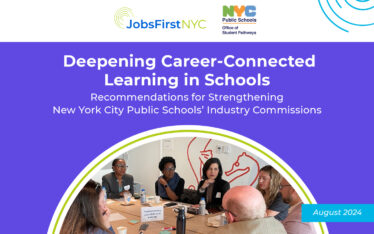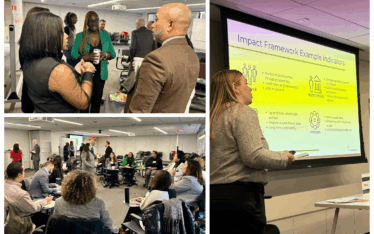JobsFirstNYC’s partners at the Aspen Institute’s Opportunity Youth Forum estimate that anywhere from 259,000 (27%) to 324,000 (34%) 16- to 24-year-olds across New York City are out of school and out of work.* Just last year in 2019, there were only 129,000 (13%) of New Yorkers in this same demographic.
While the biggest driving force of the out-of-school, out-of-work rate is the health of the overall economy, it’s important to recognize that yet again young adults will be put at the back of the line when it comes to accessing opportunities in an incredibly competitive and uncertain labor market as a result of the COVID-19 global pandemic. Alongside these realities are increased fiscal uncertainty for education and employment programs and, as a result, a weakened infrastructure that is ill-equipped to respond to this crisis. As Mayor de Blasio’s term nears an end—and as mayoral candidates continue to campaign—we (the collective we) must ask: What’s the City’s plan to address the growing economic crisis with an estimated 27 to 34 percent of 16- to 24-year-olds out of school and out of work?
Inferences we can make based on lessons gleaned from how young adults fared following the last recession and what we are experiencing today:
- Young adults are at the back of the employment line. Young adults will have less access to meaningful employment opportunities as the labor market becomes more competitive and older, more experienced workers secure jobs first. Nearly all employment gains for young adults in New York City following the last recession were made in low-wage, part-time jobs, raising questions about what kind of economic opportunities are available to tomorrow’s workforce.
- Skills and competencies. Training and skills development will be even more critical as the labor market becomes more efficient by putting a premium on skills over credentials. It will be critical for community colleges and workforce development training providers to design more responsive programs and pathways that connect trained young adults directly to employment opportunities that have growth potential.
- Work-based learning is at risk. Young adults will have even less access to early work experiences like internships and other work-based learning opportunities that are critical to preparing them for post-secondary opportunities and the workforce as employers grapple with their own unique challenges brought on by COVID-19.
- Barriers are more interconnected than ever, making partnerships even more critical. Human service institutions have been increasingly charged with addressing all the barriers such as mental health and housing insecurity that their clients face in accessing economic opportunities. As resources become even more limited at the same time need is alarmingly high, partnerships and collaborations that can do more with less will become essential to support the full needs of young adults and their communities.
- New York City’s system continues to lack fundamental elements of leadership, strategy, data, coordination, and investment. Despite promising bright spots across the field, New York City’s young adult workforce development system is fragmented across multiple agencies without a set of shared performance indicators. Citywide leadership is needed to develop a clear strategy that connects public and private investment and operates at scale with the employer community.
Given the stark economic outlook for young adults and their communities, JobsFirstNYC, with our advocacy partners in Invest In Skills NY, is getting organized and we are asking you to join us. In the coming weeks, we will be engaging with all of our stakeholders to develop a new agenda for what the next generation of New York City’s young adult workforce development system could and should look like. Over the coming weeks and months we will be raising awareness about the realities facing young adults, engaging all of our stakeholders for input, developing a clear future-focused agenda, and publishing a detailed report that will serve as a roadmap for recovery that prioritizes the needs of young adults.
To get started, we are calling on our partners to elevate the crisis-level challenges that today’s young adults are facing. As we anticipate the release of the first report from the Mayor’s Disconnected Youth Task Force, we are reminded that any plan must include an investment strategy with specific and measurable goals. Click the below buttons or use the sample text to share in your own communication:
ReTweet JobsFirstNYC: Click the Link Here!
Sample Text:
What’s the City’s plan to address the growing economic crisis with an estimated 27 to 34% of 16-24 year olds out-of-school and out-of-work? #FutureofWork @JobsFirstNYC @nycmayor
Source: *Estimating Community-Level Numbers of Opportunity Youth for May 2020: New York City. Aspen Institute Forum for Community Solutions (internal communication). July 20, 2020.




